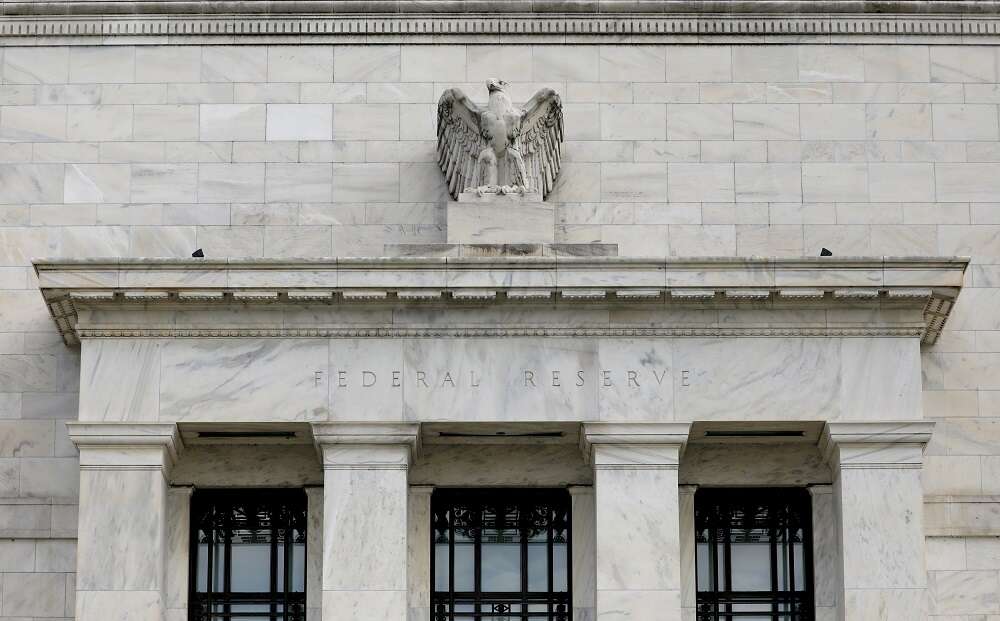
By Howard Schneider, Lindsay Dunsmuir and Ann Saphir
WASHINGTON (Reuters) -The U.S. economic recovery remains on track despite a rise in coronavirus infections, the Federal Reserve said on Wednesday in a new policy statement that remained upbeat and flagged ongoing talks around the eventual withdrawal of monetary policy support.
In a news conference following the release of the statement, Fed Chair Jerome Powell said the U.S. job market still had “some ground to cover” before it would be time to pull back from the economic support the U.S. central bank put in place in the spring of 2020 to battle the coronavirus pandemic’s economic shocks.
“I would want to see some strong job numbers” in coming months before reducing the $120 billion in monthly bond purchases the Fed continues to make, he told reporters.
But Powell also set aside, at least for now, the risk that the renewed spread of the coronavirus through its more infectious Delta variant would put the recovery at risk or throw the Fed off track as it plans an exit from crisis-era policies.
“It will have significant health consequences” in the areas of the country where outbreaks are intensifying, Powell said. But in the prior waves of coronavirus infections “there has tended to be less in the way of economic implications … It is not an unreasonable expectation” that would remain the case this time, he added.
The Fed’s policy statement, issued after the end of a two-day policy meeting, reflected that confidence.
“With progress on vaccinations and strong policy support, indicators of economic activity and employment have continued to strengthen,” the central bank said in the statement.
Looking past the quadrupling of daily U.S. coronavirus infections that has occurred since the Fed last met in June, the central bank indicated it still had faith that an ongoing vaccination drive would “reduce the effect of the public health crisis on the economy” and allow a robust reopening to proceed.
Fed policymakers, in a unanimous statement, also said they were moving ahead with discussions about when to reduce the central bank’s bond-buying program, a precursor to eventually raising interest rates.
In December, the Fed said it would not change those purchases until there had been “substantial further progress” in repairing a labor market that was then 10 million jobs short of where it was before the pandemic.
That number is now below 7 million, and the Fed for the first time acknowledged the economy had taken a step towards its benchmark for reducing the $80 billion in U.S. Treasury bonds and $40 billion in mortgage-backed securities it buys each month to keep long-term borrowing costs low for consumers and businesses.
“The economy has made progress, and the (Federal Open Market) Committee will continue to assess progress in coming meetings,” the Fed said in language pointing towards a possible reduction in bond purchases later this year or early in 2021.
The Fed also said that higher inflation remained the result of “transitory factors,” meaning it was not an imminent risk.
‘MORE UPBEAT’
Along with leaving its bond-buying program unchanged, the central bank on Wednesday kept its overnight benchmark interest rate near zero.
Karim Basta, chief economist at III Capital Management, said the “incrementally more upbeat” policy statement opened the door to a September bond taper announcement if job growth comes in strong and the coronavirus caseload does not dent spending.
Acknowledging some progress towards their goals “seems designed to give them the option to announce” a change in bond purchases as soon as September, he wrote.
U.S. stocks, modestly lower before the release of the policy statement, were mostly higher in late-afternoon trading. Yields on U.S. Treasuries edged up in choppy trading. The dollar was slightly weaker against a basket of currencies.
The Fed did not release any new economic projections on Wednesday.
(Reporting by Howard Schneider and Jonnell MarteEditing by Paul Simao)


